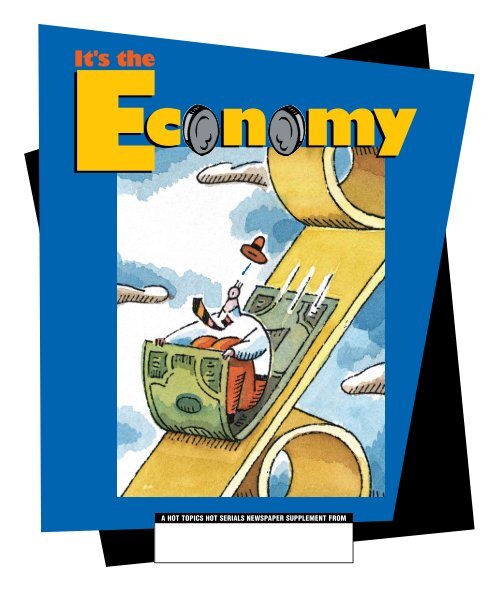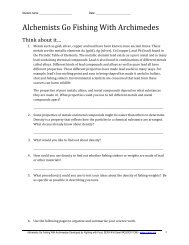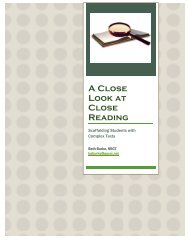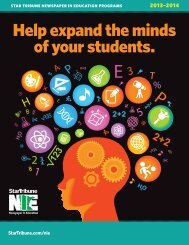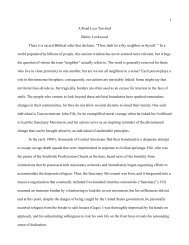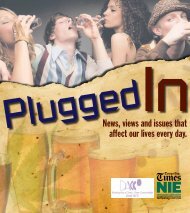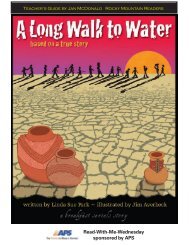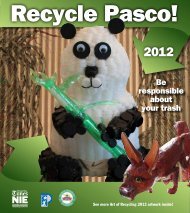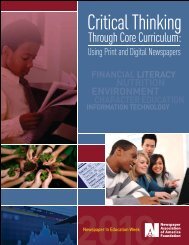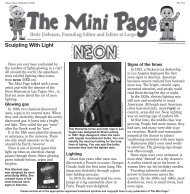Here - Newspapers In Education
Here - Newspapers In Education
Here - Newspapers In Education
- No tags were found...
Create successful ePaper yourself
Turn your PDF publications into a flip-book with our unique Google optimized e-Paper software.
It's theE c n myA Hot topics Hot Serials Newspaper supplement fromSUPPLEMENT FROM
TheEcon myWhat Does It All Mean?Economics is the study of how individuals, groups, or nations allocate their limited resources to satisfy theirunlimited wants and needs. <strong>In</strong> other words, economics is how we give people what they want when thereis never enough to go around. The economy is the term we use to identify the economic system of anindividual country or area.For example, imagine that someone has brought three candy bars into your classroom and asked ifanyone wants one. Chances are that more than three people would want one. How would your classdecide how to distribute the three candy bars? Look back at the meaning of economics. <strong>In</strong> this example,the candy bars are the limited resources because more than three people want them. Deciding who getsthem is where your class would "allocate" (give out) the "limited resources" (the candy).So, how would you decide who gets the candy? Write an essay explaining a fair way to distribute the candy. That will beyour economic plan. And, whether it goes well or badly will decide the condition of the economy in your class.The word “economy” comes from a Greek word meaning, “one who manages a household.” As you learn about theeconomy, think about the ways in which we are managing our country’s household.Why Study Economics?Economics is everywhere. It affects your life and the life of everyone around you. When you decide which things to buyand use, that’s economics. When you vote for a candidate because you think he or she will help people have more money,that’s economics. Anything you have, use, buy, read, wear, live in, drive, work with, eat, play with, or just think about issomehow connected to economics. Whew! That’s a lot to understand, but it will be worth the work. Understandingeconomics gives you the power to make decisions that will improve your life.You already know the most important fact about economics:You can’t have everything you want. You must choose some thingsand give up others. You can see how choosing wisely could makea big difference in getting at least some of what you wantand all of what you need.The National Council on Economic<strong>Education</strong> has written some standards– things you should know inorder to understand economics.Throughout this section, we will explaineach of those standards ("What to Know") andsome important keywords ("Words to Know").2$Learning ActivitiesSkill: Identifying ways of spending moneyAunt Sally gave you $100 for your birthday. Shop in the newspaper andpick out five things you would buy for yourself. Then narrow your five choicesto the one item you most want. Write a description of your five choices,and explain how and why you picked the final one.
Smart ch icesWhat to Know:People cannot have all the goodsand services they want because suppliesare limited. They must choose somethings and give up others.You Choose!How can you choose what to buy so that you get the most for your money?You can become a smart consumer who gets information that leads to getting a gooddeal. There are two easy steps. Step one on your path to economic understandingis deciding what to buy. Step two is shopping carefully.Words to Know:Scarcity, choice, goods, services,wants, opportunity, cost, consumerBefore you buy either goods (things you can touch) or services (tasks you pay someone to do foryou, such as cutting your hair), ask yourself a question: Is this something I want or something I need?The things you need are those things that keep you alive. Everything else is something you want.Once you decide how important an item is, you choose whether it is really something you have to buy.Then you work on getting the best deal.What to Know:Most choices involve doing alittle more or a little less of something.Few choices are "all or nothing"decisions.Words to Know:Decision-making,cost, benefitLet’s say you’re buying a television set, and you’relooking for the best possible deal. You can choose aset that simply lets you watch shows, or you can choosea set that comes with lots of fancy features. You want theTV, but maybe you don’t need to spend extra money forone that answers your phone and folds your laundry.Hey, you can do that yourself, right? <strong>Here</strong> is an ad fortelevision sets. Look carefully to see why the sets sellfor different prices. Which would you buy? Why?BIG SALES BLOWOUT!$21932" 720P LCDHDTV 60Hz$49832" 1080P LCDHDTV 240Hz$89832" 1080P LCDHDTV 600Hz$Learning ActivitiesSkill: Understanding concepts ofan economic system1. List the goods andservices your family usesevery day. Can you findany advertised in the news?2. Find three things youwant and three things youneed advertised intoday’s news.3
Buyers & SellersWhat to Know:Different methods can be usedto allocate (give out) goods and services.Words to Know:Market economy,command economyTo Market, To MarketThe United States economy has what’scalled a market economy, where peopledecide what to buy and what to sell.Some other countries have what’scalled a command economy, wherethe government decides how to giveout goods and services. Which doyou think is the better system? Why?$For Sale! CheapWhat to Know:People respond predictably topositive and negative incentives.Learning ActivitiesSkill: Understanding how consumers make decisions1. Find examples in the newspaper of individual buying and selling decisions.2. The newspaper shows lots of ways you could spend your time. Find one thatyou think is a wise choice and one that is not so smart.Words to Know:<strong>In</strong>centives, choice4When you behave well at school or home, do you get rewarded? Knowing that you might get a good gradeor extra credit or extra allowance encourages you to work or behave well. The rewards are yourincentives – the things that make you want to do something. Businesses try to get peopleto buy their products and services by offering incentives. It could be a sale priceor a bonus item that you get when you buysomething else. Have you ever bought somethingon sale? If you did, you acted because you hadan incentive offered to you bythe store where youbought the item.$Newspaper ActivitySkill: Understanding how a businessoperatesFind an example of a businessthat is giving people an incentiveor reward for buying something.
Everyb dy Wins!What to Know:Voluntary exchange occursonly when all participating parties expectto gain. This is true for trade amongindividuals or in different nations.Words to Know:Exchange, barter<strong>In</strong> voluntary exchange, everyone wins. Let’s say youbaby-sit for a couple because they will pay you $10.They pay for the work because they get the childcare that makes it possible for them to go out. You and the couplemake a trade – your time for their money, and you both win. You could also trade things without money. For example,you and a friend decide to trade bikes. This kind of exchange, without money, is called barter, and it is the oldest form oftrading. Write about a trade you made, either with money or without.Isn ’t that Special?What to Know:When individuals, regions,and nations specialize in what they canproduce at the lowest cost and thentrade with others, both productionand consumption increase.Coffee beans grow in warm climates. So countries with warm weatherall year can grow coffee beans for less money than in the UnitedStates, where it isn’t warm all year. It makes sense for theUnited States to import coffee beans from a country thatspecializes in growing them and can grow them morecheaply. (Imports are items we buy from anothercountry, while exports are those we sell.) Lookat the tags on the clothes you are wearing to seewhether they are imported. How did importing yourclothes benefit the countries involved?People specialize too. Your teacher went to college to learnhow to teach. A factory worker is trained to do his or herjob well. The economy depends on specialization to give peoplethe goods and services they need. That way, the person whocuts your hair can be an expert at cutting hair, while yourdoctor knows just how to keep you healthy.Words to Know:Imports, exports$Learning ActivitiesSkill: Understanding the interdependence of economies in the world1. Find a story about conflict somewhere in the world. Write an essay about how thatconflict affects the economies of the countries involved.2. Find five jobs in the Help Wanted section that require specialization.5
Supply & DemandWhat to Know:Markets exist when buyers andsellers interact. That interaction sets marketprices and allocates scarce goodsand services.Words to Know:Markets, prices, producers,consumers, demand, supplyA great new DVD has just come out and all 30 people in your class want to buy it. Lucky you! You have 10 to sell. Would yousell them for $10 each, or would you charge $20 if you thought your classmates wanted them badly enough to pay that much?Meet supply and demand. The supply is the 10 DVDs; the demand is the 30 people who want that DVD. Supply and demanddetermine how much things cost. When demand is high and supply is low, prices are high. What happens when supply ishigh and demand is low? Suppose you have 10 DVDs but only one person wants to buy. What would you charge then?What to Know:Prices send signals and provideincentives to buyers and sellers. Whensupply or demand changes, marketprices adjust.Words to Know:Price ceilings, price floors$Learning ActivitySkill: Understanding supplyand demandLook through the ads intoday’s newspaper andfind three items thatare in high demand andthree that are in lowdemand.What if you have the samenew DVD to sell, butanother kid in your classdoes, too? You and thatother kid would have tocompete for the samebuyers. Then what wouldhappen to the price ofthe DVD?What to Know:Competition among sellerslowers costs and prices, and it encouragesproducers to produce more of what consumersare willing and able to buy. Competitionamong buyers increases prices and allocatesgoods and services to those people who arewilling and able to pay the mostfor them.6$Words to Know:CompetitionLearning activitySkill: Understanding the impact ofcompetition in businessCheck the newspaper to findexamples of businesses that arecompeting with each other.How can you tell?
Imp rtant instituti nsWhat to Know:<strong>In</strong>stitutions evolve in marketeconomies to help individuals and groupsaccomplish their goals. Banks, labor unions,corporations, legal systems, and not-for-profitorganizations are examples of importantinstitutions.Words to Know:Economic institutions,banking, saving, interest, savers,borrowers, labor unionsOur economy has organizations set up to help people reach their goals.Banks help people save and earn money. Let’s say that you have some moneyto save. You could take that money to the bank, which will pay you interestin exchange for your permission to let the bank hold your money. You willactually earn money by using money you already have. The bank will thenlend your money to people who need to borrow money. So the bankmakes money using your money to charge other people money to borrowmoney. (That money is also called interest; so you earn interest when yousave and you pay interest when you borrow.)Banks match both groups of people to help them allachieve their goals. They match borrowers with savers.<strong>In</strong>vestment banks match businesses that need moneywith people who want to invest money in business.Another economic institution is the labor union.Labor unions are groups of people who worktogether. As a group, these people have morepower to make good deals with their employers.You may want to go online and read aboutthe AFL-CIO (the American Federation ofLabor/Congress of <strong>In</strong>dustrial Organizations, agroup of 66 national and international laborunions). Find them online at www.aflcio.org.$Learning ActivitiesSkills: Making decisions about banking, recognizing the importance of organizations1. Find interest rates in today’s newspaper. What are banks offering people toencourage them to save?2. Can you find any stories about labor unions in the news? Which people in thenews probably belong to a union? Check for mention of labor unions in theHelp Wanted ads.7
Make the M st of YouThe Price is Right…Or Is It?When you buy a shirt, who decides the price? Is it the store, the company that made the shirt, or you?Well, it may be all three. First, the manufacturer of the shirt figures out how many shirts are out therefor you to buy. If there are lots of shirts, prices will be low. If there are not so many shirts, the priceswill be higher. Then the manufacturer guesses how badly you want the shirt. If the manufacturer thinksyou want it badly, prices will be higher. Finally, the manufacturer has to know how much it costs tomake the shirt and to ship it to the store. At the store, the managers have to figure out how much itcosts to buy the shirt and run the store. Only then can someone decide how much to charge you.Finally, when you choose to buy the shirt, you are agreeing that the price is right. If people don’t buy thingsbecause they are too expensive, sometimes the price comes down.Opportunity CostWhen you spend money in one place, you give up the opportunity to buysomething else or to save that money. While you might really want whatever itis you buy, you must always decide whether buying that thing is how you wantto use that opportunity. That is known as "opportunity cost."Save or Spend?At one time, people saved money by banking whatever was left after payingtheir bills. But now the cost of living has gone up so that savings can nolonger be something that gets done with your extra money. <strong>In</strong> today’s economy,saving has to be something you do on purpose. If you want to save,and you should, you must have a plan, or budget, that includes savings. Andthe sooner you start saving, the better. The younger you are when youstart saving, the easier it is to accumulate larger sums of money.Starting to save right now is a great idea because you can begin to enjoysomething called "compounding." Compounding means that you earninterest not just on what you put into a bank account but also on theinterest that the bank pays you. <strong>In</strong> other words, you’ll earn interest onyour interest. Saving in a bank can be a great way to earn some money,but some banks pay higher interest rates than others, so you need toshop around.8$Learning ActivitySkill: Analyzing data about bankingCheck today's newspaper to see the differences among interest ratesat different banks.
M neyUse the Newspaper toGet A LifeBuilding a Better BudgetFinancial planners suggest that young adults spendtheir money as shown in this pie chart.Food, clothing, and shelter are often advertised in thenewspaper. Skim the newspaper to find items that arerepresented in this budget. List what you find. Whichcategory is easiest to locate? Why do you think that is so?Check the Help Wanted ads to find a job and its monthlysalary. Starting with that amount of money, figure out howmuch you would spend on each budget category. Then,using the newspaper ads, look for a place to live, a car todrive, fun things to do, and anything else that fits eachcategory of the budget.15%taxes520%foodh10%savingss30%housingx5% each ofclothing, insurance,health care,entertainment,transportation25% totaluIt Pays t L earnWhat to Know:<strong>In</strong>vestment in factories,machinery, new technology, and the health,education, and training of people can raisefuture standards of living.Words to Know:<strong>In</strong>vestment, standard of living,productivity, technological change, economicgrowth, intensive growth, opportunity cost,risk, tradeoff, interest rates, incentivesTo have a good life in the future, you have to invest right now. Are you thinking that you don’t have money to invest? Notto worry. You don’t need money. You must invest your time and energy in school, starting right now, in order to earn moremoney later. Learning will pay off, probably in a big way. The more you know, the better a worker you will be, and themore money you will earn.9
M ney MattersWhat to Know:Money makes it easier totrade, borrow, save, invest, and comparethe value of goods and services.Words to Know:Role and function of moneyWhat to Know:<strong>In</strong>terest rates, adjusted forinflation, rise and fall to balance the amountsaved with the amount borrowed.Words to Know:<strong>In</strong>terest rateMost people would like to have more money, but the realvalue of money is found in the goods and services that canbe bought with the money. Money makes it easier for peopleto get what they need or want. When people buy and sellmany things, the economy grows, and that’s good foreveryone. When people don’t buy so much, theeconomy slows, and that’s no good.Banks and other lenders help the economy growby allowing more money to be used in the market.When you put your money in the bank, it joins themoney of other savers. Then people and businessescan borrow the money and make more things tosell so that the economy grows.10$Learning ActivitySkill: Identifying ways of spending and saving moneyWhen you buy something now and pay for it later, that’sknown as using credit. You don’t actually get more money tospend; you just are promising to pay the money in the future.<strong>In</strong> fact, when you buy on credit, things might actually costmore because you pay extra to get something now and paylater. Find an ad for a new car and locate its price and APR(annual percentage rate). That’s the amount you will becharged to borrow the money to buy the car.How much does it increase the price?
<strong>In</strong>c meWhat to Know:<strong>In</strong>come for most people isdetermined by the market value of whatthey sell and how much they sell.Words to Know:Labor, human resources, productivity$Everyone earns money by selling either a good or a service. You can makethe most money either by selling a lot of something or by being good atthe service you sell. You make more money if you are productive – if yousell more things or you get trained well to provide good service. Oneway you can be productive is to make sure you know what you aredoing by getting the right training. Usually, the more training or schoolyou go through, the more you get paid. People pay more for smart,well-trained workers. That’s why people who work infast-food restaurants, where not much training is needed, don’t get paid as much as teachers, who need togo through years of school to learn how to teach. That’s also why people who don’t finish high school oftenearn less money than people who do get their diploma.Learning ActivitySkill: Understanding how people earn a livingCheck the Help Wanted ads to research the salaries of five different jobs, each with a different amountof school required.What to Know:Entrepreneurs are peoplewho take the risks of organizing resourcesto make goods and services.Words to Know:Entrepreneur, benefit, cost, risk,profitCold CashYou’re going to open an ice cream store in a town where it’s warm all year round. Can’t miss,right? Well, maybe, but businesspeople must look at the cost and the risk. This businesswill need a store, ice cream machines, freezers, cash registers, counters, and insurance.It will need workers to order supplies and sell ice cream. The owner will have to payenough to keep the workers happy so that they are nice to customers.The owner will also have to pay tax and keep the price of an icecream cone low enough for people to buy it. The profit, orincome, has to be good enough to outweighthe risk of loss.11 11
The RolefG vernmentWhat to Know:There is an economic rolefor government in a market economywhenever the benefits of a government policyoutweigh its costs. Governments often provide fornational defense, address environmental concerns,define and protect property rights, and attemptto make markets more competitive.Words to Know:Role of government; taxesThe government pays to build roads, but government workers don’tactually build them. The government pays (using your tax dollars)private companies to build the roads. Why? Because the privatecompanies know how to build the roads and can do it better thanthe government can. The government sometimes makes economicdecisions based on what is good for everyone. Other times, thegovernment makes decisions based on what is good for a specialinterest group. During an election, you need to look carefully at each candidate’s economic choices to makesure you vote for someone who wants to run the government the way you think it should be run.What to Know:A nation’s overall levels ofincome, employment, and prices aredetermined by the interaction of spending andproduction decisions made by all households,firms, government agencies, and othersin the economy.Words to Know:GDP (Gross DomesticProduct), unemployment12You might think that you don’t have to understand the government and its relationship toeconomics but if you do, you can make better choices when you vote and when you spend.First, you have to know how the economy is doing. That is measured, in part, by theGDP, or Gross Domestic Product. The GDP is the total value, measured indollars, of all goods and services produced in the economy in oneyear. Another measure of how the economy is doing isbased on unemployment, or the number ofpeople who want to work butdon’t have jobs.
<strong>In</strong>flati n &Unempl ymentWhat to Know:<strong>In</strong>flation can reduce the rateof growth of national living standardsbecause individuals and organizations useresources to protect themselves against theuncertainty of future prices.Words to Know:<strong>In</strong>flation, unemployment,labor force<strong>In</strong>flation means prices go up. When things cost more, you can’t buyas much, so inflation is not good for the economy. <strong>Here</strong>’s an example.Let’s say that a pair of pants cost $15 last year. If you had $30,you could have bought two pairs. But suppose inflation raises theprice of a pair of pants to $25 this year. Now you can buy onlyone pair with your $30. If people can’t buy as many pairs of pants,factories need fewer workers to make pants, and stores needfewer salespeople to sell pants. When morepeople are out of work, they can’t spendmoney. So you can see how inflation, andits rising prices, hurts the economy.Sometimes, when people vote for president,they choose someone whom they believe willbe good for the economy. What do you thinkthe president or the government can do tocontrol inflation?<strong>In</strong>flation affects the economy in other ways, too. Duringtimes of inflation, people may worry that prices will goeven higher. When that’s a fear, some people would rathersave their money than spend it. When people don’t spend, theeconomy slows down.$Learning ActivitySkill: identifying problems in an economic systemCheck the prices of cars, groceries, and televisions in today’s newspaper.Write a list of the prices you find. Ask an adult to look over your list and tellyou what some of these things cost when he or she was your age. What doesthis tell you about inflation? What do you think happens to people who are ona fixed income that doesn’t go up with inflation?13
Recessi n &Rec very• <strong>In</strong> about 2006, interest rates went up as inflation (the rise in the prices of goods and services) increased.• People who couldn’t pay their mortgages lost their homes. The homes were put on sale. Plus, since more and more peoplecouldn’t afford to keep their homes, many homes were put up for sale. That brought down the prices (because the supplywas more than the demand), making everyone’s house less valuable.• Meanwhile, some of the mortgage companies had sold the loans to banks and other big lending companies. When theborrowers couldn’t pay their mortgages, the banks that bought the loans also suffered. When those companies fail, thepeople who own stock in them or work for them lose money.Spending SlowsPeople stopped spending money. They stopped buying things. So, companies that made stuff to sell stopped makingas much. Then they didn’t need as many workers so people lost their jobs. Plus, companies who aren’t doing as muchbusiness also experience falling stock prices. Stock prices are based on a company’s success. When a company isn’t doingwell, its stock price drops. Anyone who owns stock loses money. Then those people spend less and so on.America Bounces BackYou can see that a recession is complex with lots of factors. It’snot something that happens overnight. This one goes back manyyears, before President Obama took office.But, it’s his job, along with other government officials, to fix it.For example, even before Obama’s election in fall of 2008, thegovernment invested billions of dollars in banks and lendinginstitutions to help them cover some of the losses from badloans. Then the government took over several banks and, in2009 it took over General Motors, a failing car company. Theyhope to run them better so they can make money again. Ifbanks do better and can lend money again then people canbegin borrowing (hopefully more wisely this time) and buyingagain. More buying, more things will be needed to buy andmore people will get jobs making those things.Obama also plans to invest in “green” jobs, those that areenvironmentally friendly so that the country’s economicrebound is also an environmental boost.This Hot Topics Hot Serials section was:Written by Debby Carroll withNIE activities by Ned CarrollEdited by Ken BookmanDesigned by Gilbert & Associates© Copyright 2009 Hot Topics Hot SerialsBut, the government can’t make the economy bounce back without the help ofthe American people. During a recession, people need to be smarter consumers.They spend and borrow less. They cut back on things they don’t really need. Evenyoung people like you are affected. Think about this: How has the economy touchedyour life? What can you do to make things easier for yourself and your family today?And, what about tomorrow? By learning about how the economy works, you canmake plans for your future so that your personal financial health is strong for life.15
Gl ssaryAPR (Annual Percentage Rate): The cost of credit on a yearly basis.Barter: A voluntary exchange of items.Budget: A plan that organizes spending and saving.Competition: The number of buyers and sellers in the market.Credit: A loan that enables you to buy something now and pay more later.Demand: The quantity of goods or services that buyers are willing to purchase at thestated price at a given time.Economics: The study of choices people make to satisfy their unlimited wants.Goods: Objects that people want or need, such as shirts, cars, or hamburgers.Gross Domestic Product (GDP): Value of the total output of an economy for a year.<strong>In</strong>come: Wages paid for work.<strong>In</strong>terest: Money earned on savings or charged to borrowers by lenders.Market: Any place where buyers and sellers exchange goods and services.Opportunity cost: What is given up when an economic choice is made.Profit: Business income minus expenses.Risk: The chance of loss.Scarcity: The condition that results when there isn’t enough of something.Services: Things that people do for someone else in exchange for money orother services.Supply: Quantity of a good or service.Wages: The price of labor.16 16


